by Naomi L. | October 19, 2016 | Blog, Creative Writing |
Remember that list of 20 sets of homonyms I shared a year ago, or that list of 25 sets of easily confused words I shared last month? Maybe you haven’t been reading my blog for that long, but if you do recall reading them, you may appreciate the overlap of their themes in today’s creative writing post. The Error Avoidance game in the Elevate – Brain Training app includes several pairs of homophones – so many, in fact, that instead of including them in the aforementioned list of commonly confused words, I saved them to add to another list of homonyms. The English language has so many, it’s hard to keep track!
So on that note, here’s a list of 32 more pairs and sets of homonyms to watch out for in your writing. Enjoy!
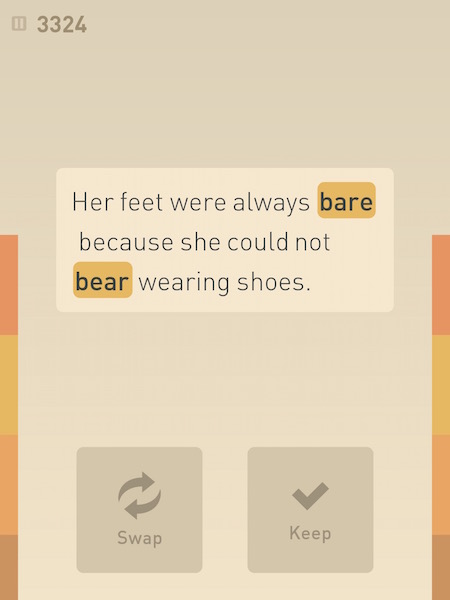 1) Bail / Bale – “Bail” is the temporary release of an accused person awaiting trial. A “bale” is a tightly wrapped bundle of a material, such as hay or cotton.
1) Bail / Bale – “Bail” is the temporary release of an accused person awaiting trial. A “bale” is a tightly wrapped bundle of a material, such as hay or cotton.
2) Bare / Bear – To be “bare” is to be uncovered. To “bear” is to carry, support, or endure.
3) Baited / Bated – To be “baited” is to be prepared with a lure or to give in to a taunt. To be “bated” is to be in great suspense.
4) Bow / Bough – To “bow” is to bend the head or upper part of the body. A “bough” is a main branch of a tree.
5) Canvas / Canvass – A “canvas” is a type of strong, coarse cloth. To “canvass” is to solicit votes from electors.
6) Cite / Sight / Site – To “cite” a passage from a book or author is to quote it as evidence for a statement. A “sight” is anything that one sees or that can be seen. A “site” is an area where a building is constructed or where an event occurs.
7) Creak / Creek – To “creak” is to make a high-pitched sound when being moved. A “creek” is a stream or brook.
8) Doe / Dough – A “doe” is a female deer. “Dough” is a mix of flour and liquid used for baking.
9) Fair / Fare – To be “fair” is to be in accordance with the rules, while a “fair” is a gathering of amusements for public entertainment. A “fare” is the money a passenger has to pay for public transportation, while to “fare” is to perform in a specified way.
10) Faze / Phase – To “faze” someone is to disturb or disconcert them. A “phase” is a distinct period or stage in a process.
11) Flair / Flare – “Flair” is a special ability for doing something well. A “flare” is a burst of bright light or flame.
12) Floe / Flow – A “floe” is a sheet of floating ice. To “flow” is to steadily move along in a continuous stream.
13) Foreword / Forward – A “foreword” is a short introduction to a book. “Forward” is toward the front or future.
14) Gored / Gourd – “Gored” is the past tense of “gore”, which means to pierce or stab. A “gourd” is a large fleshy fruit or a drinking container.
15) Hail / Hale – “Hail” is frozen rain. To be “hale” is to be strong and healthy.
16) Hangar / Hanger – A “hangar” is a building for housing an aircraft. A “hanger” is an item that holds clothes.
17) Hawk / Hock – A “hawk” is a bird of prey, while to “hawk” is to peddle goods. To “hock” is to pawn one’s possessions, while a “hock” is a cut of meat.
18) Hew / Hue – To “hew” is to chop or cut. A “hue” is a color or shade.
19) Hoard / Horde – To “hoard” is to amass money or valuable items and store them away. A “horde” is a large group of people.
20) Lightening / Lightning – “Lightening” is the act of making something lighter. “Lightning” is an electrical weather phenomenon.
21) Loath / Loathe – To be “loath” is to be reluctant or unwilling. To “loathe” is to hate or despise.
22) Pail / Pale – A “pail” is a bucket. To be “pale” is to be light in color or to seem less important.
23) Pair / Pare – A “pair” is a set of two. To “pare” is to trim away the outer edges of something.
24) Palate / Palette / Pallet – A “palate” is a person’s appreciation of taste and flavor. A “palette” is a range of colors used by an artist. A “pallet” is a portable platform used for moving, stacking, and storing goods.
25) Peal / Peel – To “peal” is to ring loudly. To “peel” is to remove an outer layer.
26) Premier / Premiere – To be “premier” is to be first in importance. A “premiere” is the first performance or showing of a theatrical work or movie.
27) Raise / Raze – To “raise” is to lift up. To “raze” is to destroy completely.
28) Reek / Wreak – To “reek” is to smell strongly and unpleasantly. To “wreak” is to inflict or cause a large amount of damage.
29) Sear / Seer / Sere – To “sear” is to burn or scorch the surface of something. A “seer” is a person who supposedly is able to see what the future holds. To be “sere” is to be dry or withered.
30) Succor / Sucker – “Succor” is a form of assistance and support. A “sucker” is a lollipop or a gullible person.
31) Vice / Vise – A “vice” is a moral flaw. A “vise” is a device that holds an object in place.
32) Warrantee / Warranty – A “warrantee” is a person to whom a guarantee is given. A “warranty” is a written guarantee promising to repair or replace a purchase if necessary.
Have you ever mixed up these words before? What other pairs or sets of homonyms would you add to this list?
by Naomi L. | October 17, 2016 | Blog, Word of the Week |
Word: pundit
Pronunciation: PƏN-dət
Part of Speech: noun
Definition: an expert in a particular subject or field who is frequently called on to give opinions about it to the public
Source: Oxford Dictionaries
I maintain that I don’t like to get political on my blog, but with Election Day in the US drawing ever nearer and all the articles drifting through my news feed about the American presidential race, it’s hard not to find interesting new words to add to my vocabulary list! This week’s word seems to come up in every other political news article I read these days, as many of these mention expert opinions on a given topic. This is hardly surprising, of course: in a field as volatile and confusing as politics, the input of “pundits” is important to keep an element of truth in the news!
A “pundit” is an expert in a specific field or subject who is often invited to give opinions on it to the public. The word is also a variant spelling of “pandit”, meaning “a Hindu scholar learned in Sanskrit and Hindu philosophy and religion”. Both words derive from the Sanskrit adjective paṇḍitá, which means “learned”.
Though lately I’ve been reading the word “pundit” exclusively in political contexts, I’m sure it can refer to an expert in any given field who frequently contributes opinions to public discussions. Notably, the word “pandit”, from which “pundit” derives, is an Indian word that, aside from the main definition given above, can also be used as a term for a wise man or teacher or as a respectful title for a talented musician. If you write characters who are experts in their fields and who could frequently be invited to deliver their opinions, you may have fun calling on the “pundits” in your stories!
What are your thoughts on this word? Any suggestions for future “Word of the Week” featured words?
by Naomi L. | October 14, 2016 | J.C. Wolfe's Writing, Poetry |
Mastering a science is an
Adventure and a challenge.
Research requires strong qualities:
Intelligence, passion, and dedication.
New horizons await those seeking an
Education in the biological sciences!
Environmental marine studies are a
Challenging field to explore, as the
Oceans are teeming with all forms of
Life and complex ecosystems. Still,
Overwhelming hours of research led to the
Greatest achievement of my life!
Years of studying reef fish have truly paid off!
by Naomi L. | October 12, 2016 | Blog, Creative Writing, Featured |
Yes, I know I’ve been writing a lot about my recent graduate school achievement lately and it might be getting tiresome to my regular readers. Don’t worry; I promise it’ll only go on for like, two more months (just kidding!). In all seriousness, though, my Master’s thesis did teach me a lot about writing, as much in science as in general, and since it’s been such an insightful experience, I thought it would be fun to share what I learned on my creative writing blog.
So on that note, here are five lessons I learned from writing my Master’s thesis. Enjoy!
1) A thesis will never, ever be perfect. Ever.
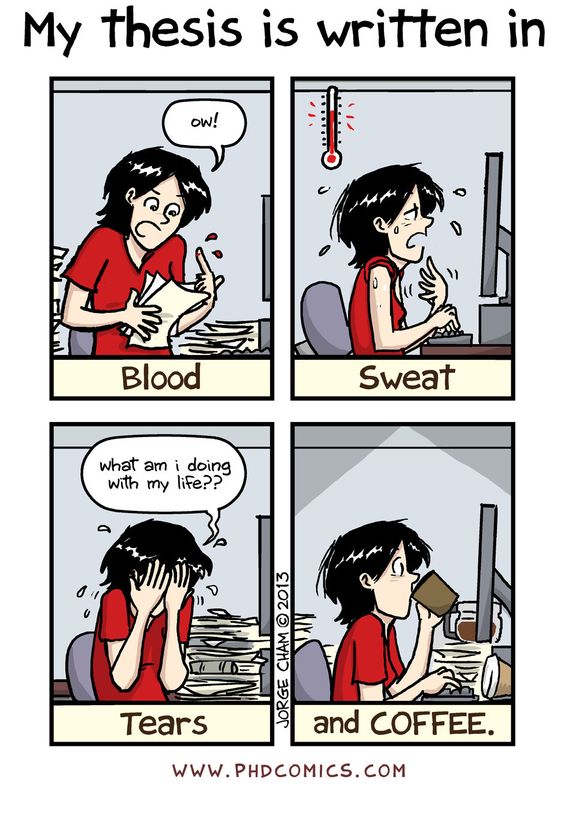
“Piled Higher and Deeper” by Jorge Cham
www.phdcomics.com
This point is worth mentioning first as it applies to all types of writing. Seasoned writers all know that a huge part of writing is rewriting, and that arguably holds true for nonfiction more than any other genre. One of the most important lessons I learned through my years in college and grad school is that scientists can’t hope to turn out quality papers and articles without rigorous research and engaging discussions of their results, but the challenge of writing about science is that science is constantly changing. New research is being published every day and new ideas are emerging every hour, making it nearly impossible to keep drafts of a paper or thesis updated to the minute.
But an endless stream of new research isn’t the only challenge of academic writing. Perfectionism has long been a barrier to productivity, as any writer with a strong inner critic can attest. You can strive to cite every relevant reference, cover every possible discussion point, and smooth out every error to the tiniest misplaced comma, but at some point you just have to accept that your paper/article/thesis will never be flawless by the time you submit it for publication. Don’t sweat it; that’s what editors are paid for!
Writing my thesis definitely pushed my limits in academic literacy and technical perfectionism. Tackling both these obstacles every day, it’s a wonder I ever even finished the first draft!
2) Scientific writing is not the same as literary writing.
Most of my writing takes the form of stories and poetry, which presented a challenge for me when it came to writing the main chapter of my thesis. Despite constant reminders to myself of the differences between scientific and literary composition, more than once I found myself falling into old creative writing habits, including, but not limited to:
- omitting important explanations in the introduction,
- using layman’s terms in place of scientific terms,
- lampshading flaws and shortcomings in the study (yes, really), and
- building suspense to the “grand reveal” of my results (which I still think was justified given that I discovered we were dealing with a different species than we initially thought).
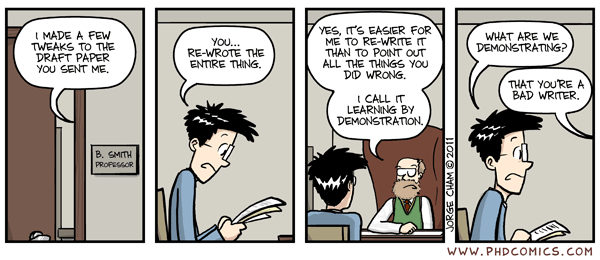
“Piled Higher and Deeper” by Jorge Cham
www.phdcomics.com
Honestly, my artistic side wants to turn everything I learned throughout my Master’s program into a novel, but my scientific side insists on being reasonable (i.e. following my professor and colleagues’ directions) and sticking to hard facts and logical discussions without embellishing the text with my storytelling voice. If this whole endeavor wasn’t challenging enough to begin with, these dueling voices in my head made the final stretch one heck of a ride!
3) Between the time you start your thesis and the time you defend it, your project will change at least a dozen times.
And if you’re lucky, that’s the most it will change. I was accepted into my Master’s program with a proposal for a phylogeographic study of four reef fish species spanning the Atlantic Ocean. By the time I defended my thesis, the project had been narrowed down to one species in Brazil, which later turned into a study of the entire genus across the Atlantic and part of the Pacific, and had been expanded from a purely genetic analysis to include an ecological component about the fish’s feeding activity. Now try reading back this paragraph a few times fast and you may get a sense of the headaches I went through over the last few years.
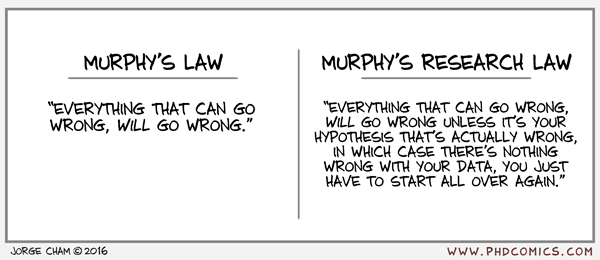
“Piled Higher and Deeper” by Jorge Cham
www.phdcomics.com
Still, exploring different projects is part of the grad school experience (or so I hear), and it was certainly an educational endeavor. Though more than a little frustrating at times, it did offer an insight into the life of a scientist: methods will fail, new ideas will emerge, projects will change, and in the end, you’ll find yourself arduously studying a subject you’d never even considered when you started. New grad students, be warned: until you finally defend your thesis/dissertation, you’re in for an academic rollercoaster ride!
4) Coauthoring is both easier and harder than writing alone.
Speaking as a writer who prefers to work solo, I’ve found there are advantages and disadvantages to collaborating with other authors on an article. On the one hand, different perspectives mean different ideas and contributions, which more often than not result in a well-rounded study and, consequently, a high-quality paper. On the other hand, opinions between authors can (and will) conflict during the writing process, which will make turning out the final draft all the more challenging.
As the lead author of a paper with five names to its title (and counting), I’m in charge of writing the text and integrating the other authors’ notes and revisions into each draft. The main advantage of this is that each researcher has their own area of expertise, so I’ve gotten plenty of help as much for the genetic part of the study as for the ecological part. However, some points in the discussion tend to have opposite approaches, and sure enough, I’ve rewritten some paragraphs a few times over after disagreements arose between my coauthors about how best to discuss the results.
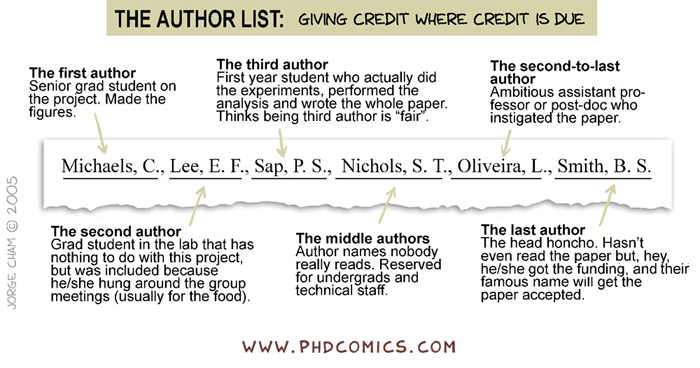
“Piled Higher and Deeper” by Jorge Cham
www.phdcomics.com
Finding a balance hasn’t always been easy, but since all my solo writing experience has been related to fiction, I’m glad to have so much extra input on this project. All that matters is that the final paper is worthy of publication!
5) Successfully completing and defending a thesis brings an incredible sense of accomplishment.
At the risk of sounding cheesy, words cannot describe the elation I felt while standing before the audience at my defense and thanking them for watching the presentation I had just concluded. In that moment, all my hard work, perseverance, and bouts of stress, anxiety, and tears had finally been validated. I was so proud of myself for having made it to that point that I smiled through the whole evaluation and Q&A segment that followed. It was one of the greatest successes of my life, and though it isn’t a bestselling novel, the thesis I toiled over for a year and a half will always hold a special place among my most treasured pieces of writing.
The only question now is whether this sense of achievement is enough motivation to take on double the hard work in pursuit of a doctorate…

“Piled Higher and Deeper” by Jorge Cham
www.phdcomics.com
What about you? Do you have any college or grad school experiences to share? How have they influenced your writing?
All images in this post are from the comic series “Piled Higher and Deeper” (a.k.a. PHD Comics) by Jorge Cham; I own nothing! For a hilarious insight into life (or lack thereof) in academia, I highly recommend you check out his work!
by Naomi L. | October 10, 2016 | Blog, Word of the Week |
Word: oeuvre
Pronunciation: Ə-vrə / OO-vrə
Part of Speech: noun
Definition: the works of a painter, composer, or author regarded collectively
Source: Oxford Dictionaries
I’ll be honest: at the time of writing this post, I’ve known today’s vocabulary word for less than a week. It came up while I was researching my last post on Romeo & Juliet, and as soon as I read it, I knew I had to add it to my Word of the Week queue. Maybe it’s the French pronunciation or its association with works of art, but something about this word just appeals to me as a writer. Who among us budding artists doesn’t dream about having a respectable “oeuvre” someday?
An “oeuvre” is the complete collection of an artist’s works, typically a painter, composer, or author. The word arose in English in the late 19th century and is originally a French noun meaning “work”. This noun derives from the Latin noun opus, which also means “work”.
Aside from its main definition, the word “oeuvre” can also refer to a single work of art, music, or literature. As far as how to use it, I’d say it works equally well in reference to all forms of art, though for some reason I find myself envisioning paintings and other visual works of art when I read it (perhaps I’m associating it with the Louvre?). If you write artistic characters with an extensive body of work (or you simply want a fancy way to refer to another artist’s, or even your own, creative collection), “oeuvre” may be a good word to include in your vocabulary list!
What are your thoughts on this word? Any suggestions for future “Word of the Week” featured words?
 1) Bail / Bale – “Bail” is the temporary release of an accused person awaiting trial. A “bale” is a tightly wrapped bundle of a material, such as hay or cotton.
1) Bail / Bale – “Bail” is the temporary release of an accused person awaiting trial. A “bale” is a tightly wrapped bundle of a material, such as hay or cotton.






Recent Comments